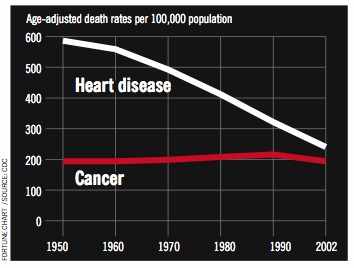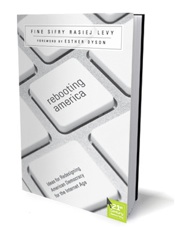Technology
Scientific Singularity?
A couple of weeks ago Kevin and I went around on the topic of whether or not science is “broken”. We came to the point of agreeing that we have different basic assumptions of what constitutes “utility”. And because of this, while we could agree that each of our arguments made sense logically, we ultimately end up with opposite conclusions. After all, for something to be broken it means that it once served a purpose that it no longer is able to serve due to mechanical/structural failure. And to have a purpose means that it has value (i.e. utility) to someone.
So whether science is broken or still works depends your definition of utility. Kevin and I agreed on a measurement for scientific utility, based on (a) how well it explains observed phenomena, (b) how well it predicts new phenomena, and (c) how directly it leads to creation of technologies that improve human lives. We can call it “explanatory power” or EP for short. …
The Technium
Here are the slides from his talk. My favorites are 3, 4, 8, 10, 15, 19, 21, 23, 26, 28, 29, 35, 37, 38, 53, 66, 68.
Approaching a Cure for Cancer
James Watson, co-discoverer of DNA’s double-helix structure recently called for a back to basics approach in dealing with cancer. In previous post threads I’ve discussed cancer’s complexity and in particular the confounding and scary implications of somatic evolution, which underscores some of the reasons we are not winning the “war on cancer.” Here I will discuss some cutting edge approaches to treating and preventing cancer and how they might pan out in light of the complexities of the disease. The categories below are not mutually exclusive, and the examples cited are nowhere near exhaustive, but this should give you some food for thought. If you have ideas, questions or know of approaches that should be highlighted, please comment.
Target & Kill Approaches
Biris and Zharov are making some exciting progress in using nanotubes to tag and then track cancer cells inside the body as they move around. They propose to kill the cancer cells by heating up the nanotubes using lasers, while others are …
Methuselah Foundation
If, like Aubrey de Grey, you believe that immortality is achievable, or you are just intrigued by the possibility, you should check out this news story on The Methuselah Foundation.
…
Technology Evolution Will Eclipse Financial Crisis
This is a precursor to Singularity sort of argument:…
Twitter vs. Psychoanalysis
In this Times Online article, two psychologists and an author weigh in with their view of Twitter users as narcissistic and infantile:
…The clinical psychologist Oliver James has his reservations. “Twittering stems from a lack of identity. It’s a constant update of who you are, what you are, where you are. Nobody would Twitter if they had a strong sense of identity.”
“We are the most narcissistic age ever,” agrees Dr David Lewis, a cognitive neuropsychologist and director of research based at the University of Sussex. “Using Twitter suggests a level of insecurity whereby, unless people recognise you, you cease to exist. It may stave off insecurity in the short term, but it won’t cure it.”
For Alain de Botton, author of Status Anxiety and the forthcoming The Pleasures and Sorrows of Work, Twitter represents “a way of making sure you are permanently connected to somebody and somebody is permanently connected to you, proving that you are alive. It’s like when a parent goes
Response to "Superorganism Considered Harmful"
This is a response to Kevin’s post responding to my post.
…Rafe makes an analogy to cells within a multicellular organism. How does this support the assertion that there will only be one superorganism and that we will need to subjugate our needs to its own? Obviously, there are many multicellular organisms. Certainly, there are many single-celled organisms that exist outside of multicelluar control today. So where is the evidence that there will be only one and that people won’t be able to opt out in a meaningful sense?
Rebooting America
Anyone interested in how technology and policy can work together to form us a more perfect union should read Rebooting America. If your budget is tight right now, you can download the PDF version for free.
While you are at it, check out the Personal Democracy Forum which is the larger effort that Rebooting America is part of.
…“Never doubt that a small group of thoughtful, committed people can change the world. Indeed. It is the only thing that ever has.”
Margaret Mead
How Grandma Saved Democracy
Visiting my 90 year old grandma a couple of weeks ago, I saw the opportunity for a product that I think would have a lot of success in the marketplace. Like the iPhone though, it’s not so much the idea — I’m sure someone is working on or already has the idea — but rather in the implementation and interface.…
TED Talk: Susan Blackmore
Memes and “temes”
Apropos of Kevin’s post yesterday on the “Singularity“, we need to be taking more seriously cultural agency (which includes technological and socio-technological agency):…

